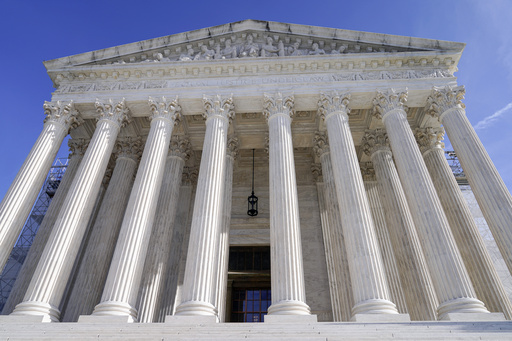WASHINGTON (AP) — The Supreme Court on Tuesday left in place the admissions policy at an elite public high school in Virginia that some parents claimed discriminates against highly qualified Asian Americans.
The court’s order, over the dissent of Justices Samuel Alito and Clarence Thomas, ended a legal challenge to a policy that was overhauled in 2020 to increase diversity, without taking race into account.
A panel of the federal appeals court in Richmond had earlier upheld the constitutionality of the admissions policy at the Thomas Jefferson High School for Science and Technology, a school frequently cited among the best in the nation.
The high court’s consideration of the case followed its decision in June that struck down admissions policies at colleges and universities that took account of the race of applicants.
The Fairfax County School Board overhauled the Thomas Jefferson admissions process in 2020, scrapping a standardized test. The new policy gives weight in favor of applicants who are economically disadvantaged or still learning English, but it does not take race into account.
The effect in the first freshman class admitted under it was to increase the percentage of Black students from 1% to 7% and Hispanic students from 3% to 11%. Both groups have been greatly underrepresented for decades. Asian American representation decreased from 73% to 54%.
For the current school year, Black and Hispanic students made up 6.7% and 6%, respectively, of those offered admission, the school board said. Asian Americans represented 61.6% of those admitted, the board said.
’We have long believed that the new admissions process is both constitutional and in the best interest of all of our students. It guarantees that all qualified students from all neighborhoods in Fairfax County have a fair shot at attending this exceptional high school,” said Karl Frisch, Fairfax County School Board chair.
In 2022, a federal judge found the school board engaged in impermissible “racial balancing” when it overhauled admissions. The appeals court reversed that ruling.
Alito wrote that the district court got it right. The appeals court essentially ruled that “intentional racial discrimination is constitutional so long as it is not too severe,” he wrote.
The parents who challenged the policy say it discriminates against Asian American applicants who would have been granted admission if academic merit were the sole criteria, and that efforts to increase Black and Hispanic representation necessarily come at the expense of Asian Americans.
“The Supreme Court missed an important opportunity to end race-based discrimination in K-12 admissions,” said Pacific Legal Foundation senior attorney Joshua Thompson, who represents the parents who challenged.
This website uses cookies so that we can provide you with the best user experience possible. Cookie information is stored in your browser and performs functions such as recognising you when you return to our website and helping our team to understand which sections of the website you find most interesting and useful.
